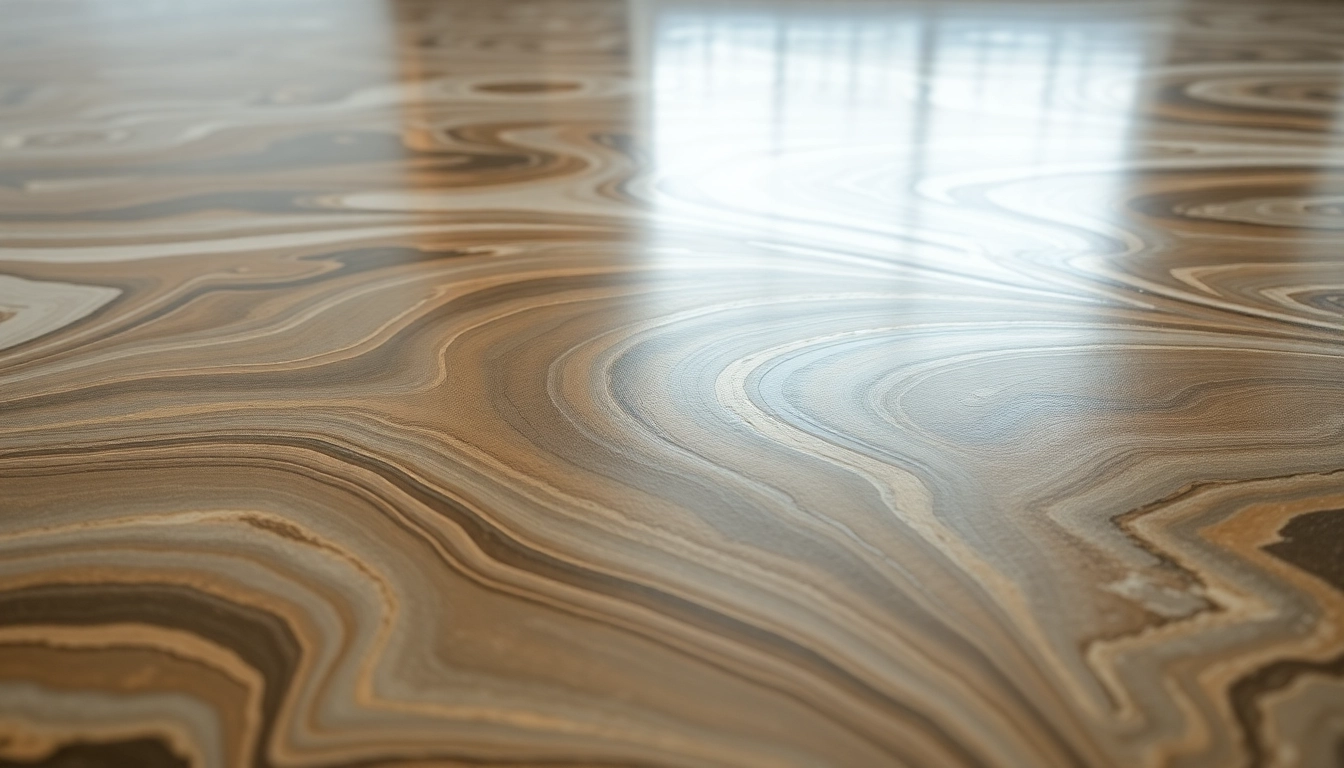Understanding Epoxy Resin Floors: Benefits and Applications
Epoxy resin flooring has become an increasingly popular choice for both commercial and residential spaces due to its superior durability, aesthetic versatility, and ease of maintenance. This type of floor coating involves applying a resin-based material composed of epoxy polymers that chemically bonds with concrete or other substrates, creating a seamless, high-performance surface. For homeowners, business owners, and facility managers considering a durable flooring upgrade, understanding the fundamental aspects of epoxy resin floors is essential.
If you’re exploring options for a resilient, attractive surface, discover more about the epoxy resin floor and how it can transform your space.
What is an Epoxy Resin Floor and Where is it Used?
An epoxy resin floor is a type of resinous flooring system made from a two-component epoxy mixture that, when combined, forms a rigid plastic material capable of curing into a strong, durable surface. Its versatility allows it to be applied in a multitude of settings, including industrial warehouses, commercial kitchens, hospitals, garages, basements, retail spaces, and even high-end residential areas. The seamless finish not only enhances aesthetics but also simplifies cleaning and maintenance.
Common applications include:
- Industrial facilities: warehouses, factories, and manufacturing plants where resistance to chemicals, abrasion, and impact is critical.
- Commercial spaces: retail stores, restaurants, and offices seeking stylish, functional flooring.
- Residential settings: garages, basements, and home workshops that require durable, easy-to-maintain surfaces.
For expert advice on selecting the most suitable epoxy system for your needs, visit our comprehensive guide or consult a professional installer.
Advantages of Epoxy Flooring in Industrial and Residential Settings
The appeal of epoxy resin floors stems from their multitude of benefits:
- Exceptional durability: Epoxy coatings resist wear and tear, making them ideal for high-traffic areas.
- Chemical resistance: They stand up against spills of acids, alkalis, oils, and cleaning agents, minimizing damage.
- Seamless and hygienic: The monolithic surface prevents dirt accumulation and simplifies cleaning routines, which is critical in food processing or healthcare environments.
- Customizable aesthetics: From matte to high-gloss finishes, with options for decorative effects like metallics or marbling, epoxy floors can be tailored to match interior styles.
- Cost-effectiveness: While initial investment varies, the long lifespan and low maintenance costs offer significant savings over time.
- Quick installation: Modern epoxy systems can be applied rapidly, reducing downtime in commercial or industrial settings.
These advantages make epoxy floors a strategic choice for property owners aiming to combine functionality with visual appeal.
Common Types of Epoxy Resin Floors and Their Features
The market offers several epoxy formulations, each suited to specific applications:
1. Solid Epoxy
Comprising pure resin with minimal solvents, solid epoxy provides a hard, thick coating ideal for industrial environments needing high resistance. It’s often used as a base layer.
2. Self-Leveling Epoxy
Known for its smooth, glossy finish, this epoxy flows easily, creating a seamless surface suitable for showrooms, kitchens, and show areas.
3. Epoxy Mortar
A heavy-duty, high-build overlay designed to repair and reinforce concrete substrates. It can fill cracks and level uneven surfaces.
4. Decorative Epoxy
Incorporates pigmented resins, metallics, or chips to produce aesthetic effects like marbling, terrazzo, or custom color blends.
Selecting the right type depends on your specific needs, maintenance requirements, and aesthetic preferences.
Choosing the Right Epoxy Resin Floor for Your Project
Factors to Consider: Durability, Aesthetics, and Budget
Before committing to an epoxy floor system, assess your priorities:
- Durability: How much foot or vehicle traffic? Will it face chemical exposure or heavy impacts?
- Aesthetics: Do you want a sleek, professional look or a colorful decorative finish?
- Budget: What are the project costs and long-term maintenance expenses? Quality epoxy projects tend to have higher upfront costs but offer superior lifespan and resistance.
Different Formulations and Finish Options
Epoxy systems come with various finishes:
- Matte finishes: Subdued look, good for hiding imperfections.
- High-gloss: Enhanced shine and reflectivity, ideal for showrooms or performance spaces.
- Textured surfaces: Incorporate aggregates or non-slip additives for safety in wet areas.
- Decorative effects: Metallic, translucent, or marbled finishes add unique visual impact.
Professional Installation vs DIY Epoxy Applications
While DIY kits are available and can be suitable for small or uncomplicated projects, professional installation offers benefits:
- Expert surface preparation ensuring optimal adhesion and longevity
- Knowledge of formulation selection for specific environments
- Advanced application techniques for seamless, high-quality finishes
- Better management of curing conditions
For complex or large-scale installations, hiring certified epoxy flooring specialists is highly recommended to ensure durability and meet safety standards.
Preparing for and Applying Your Epoxy Resin Floor
Surface Preparation Tips for Seamless Application
Proper preparation is crucial:
- Clean thoroughly: Remove dust, dirt, grease, and existing coatings.
- Repair damages: Fill cracks and level uneven areas with patching compounds.
- Etching or grinding: Create a roughened surface for better adhesion, especially on smooth concrete.
- Ensure moisture control: Check for rising damp or excessive moisture that can impair epoxy bonding.
Step-by-Step Guide to Applying Epoxy Resin Flooring
- Gather materials and verify environmental conditions (temperature, humidity).
- Mix epoxy components according to manufacturer instructions, ensuring thorough blending.
- Pour and spread the epoxy using rollers or squeegees, starting from the far corner.
- Apply multiple coats if necessary, allowing proper curing time between layers.
- Add decorative elements or slip-resistant additives during the final coat as desired.
- Allow full curing as specified; avoid foot traffic during this period.
Maintenance and Long-term Care to Ensure Durability
Once installed, epoxy floors require minimal but consistent care:
- Regular cleaning with non-abrasive methods—sweeping and mopping.
- Immediate cleanup of spills to prevent staining or damage.
- Avoid harsh chemicals or abrasive cleaners that can degrade the surface.
- Inspect periodically for chips or cracks and address repairs promptly.
Enhancing Space with Custom Epoxy Designs and Colors
Incorporating Decorative Epoxy Techniques such as Metallic and Marbled Effects
Decorative epoxy is a powerful tool to transform ordinary floors into eye-catching features. Metallic pigments can create dynamic, swirling patterns resembling liquid metal, while marbling techniques mimic the look of high-end stone. These effects are achieved through specialized mixing and application methods, often combined with resin overlays and color additives.
Color Selection Strategies to Match Interior Styles
The right color palette can tie your flooring into your overall interior design. Neutral tones like gray, beige, or white offer versatile backgrounds, while bold colors or custom shades can serve as focal points. Consider factors such as lighting, ambient colors, and functional needs—for example, darker shades hide stains better, whereas lighter tones can make spaces appear larger.
Creative Ideas for Epoxy Flooring in Garages, Basements, and Commercial Areas
In a garage, polyaspartic or high-build epoxy layers with anti-slip finishes provide durability and safety. Basements can benefit from waterproof, decorative designs that brighten and personalize the space. Commercial areas often require seamless, high-traffic-resistant floors with branding or color themes incorporated into the epoxy layers.
Performance Metrics and Cost Considerations
Measuring the Durability and Resistance of Epoxy Floors
The longevity of an epoxy floor is influenced by several key performance metrics:
- Hardness: Resistance to scratches and dents.
- Chemical resistance: Ability to withstand spills and cleaning agents.
- Abrasion resistance: Durability against foot and wheeled traffic.
- Impact resistance: Ability to withstand shocks without damage.
- Adhesion strength: Bonding durability with substrate, especially important in humid or problematic environments.
Cost Analysis: Investing in Quality Epoxy Resin Floors
Costs can vary significantly based on the epoxy type, surface area, complexity of the design, and labor. Basic DIY kits start around $60 for small applications, while professional installations for commercial-grade systems can range from several hundred to thousands of pounds. Considering the long-term benefits—such as reduced maintenance, increased safety, and enhanced appearance—investing in high-quality materials and professional application often results in a better return on investment.
More detailed financial insights can be found in case studies highlighting successful epoxy flooring projects across various industries.





